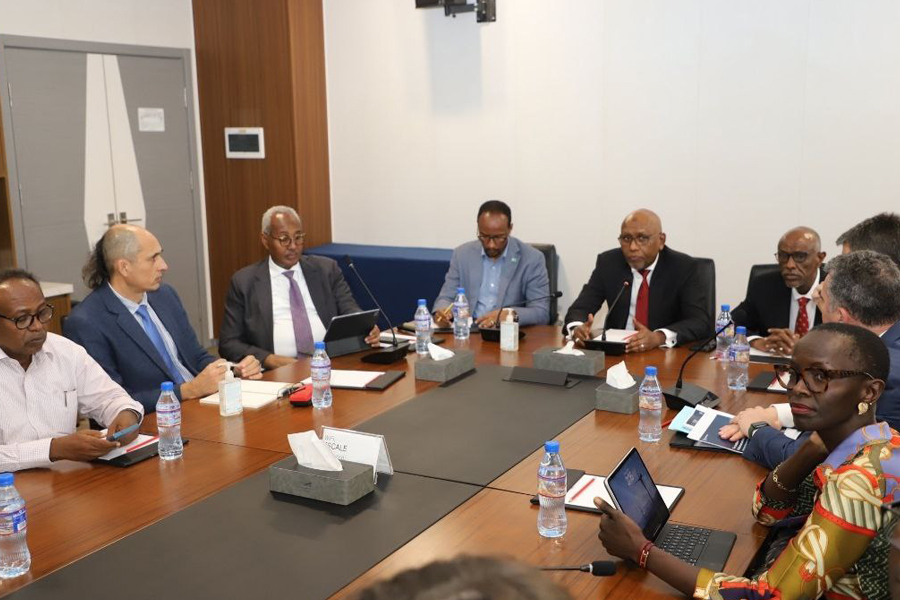
For Nega Gudetaa, a hydraulics lecturer at Mizan Tepi University in South West Regional State, becoming a researcher was a lifelong dream. He graduated with honours, yet the reality of his career has not matched his expectations. Nega echoes a growing concern within the academic community—struggling to survive on a lecturer's salary. His gross monthly salary of 12,000 Br barely covers his expenses after sending a portion to his family and paying rent.
"How can I talk about the quality of education in this state?" he asks.
Some of Nega's colleagues have resorted to driving three-wheelers incognito to make ends meet. This issue has only intensified following the recent foreign exchange regime liberalisation with the anticipated inflated cost of living, leaving civil servants like Nega feeling the sting of their diminishing paychecks. Although a monthly rent allowance was introduced for lecturers in February 2023, Nega, with eight years of experience, finds this stipend insufficient. He notes that only 350 Br of housing allowance remains after tax, with his net earnings falling below 10,000 Br.
"We need answers," he told Fortune.
University lecturers and academic staff across the country have been engaged in a prolonged struggle to improve their working conditions and secure adequate salaries. They argue that their current pay is insufficient to meet the rising cost of living and does not reflect their qualifications and contributions to higher education. With the new academic year looming, they are allying to get their demands heard including better pay, housing, and working conditions.
Ethiopian Teachers Association, the principal lobbying group for educators, has raised concerns about the 2019 salary increment for the highest-ranking academic staff—a mere 223 Br. Three years later, a letter signed by Yohannes Benti (PhD), president of the Association, was sent to several institutions, including Parliament and the Prime Minister's Office, outlining these grievances.
"It doesn't even cover a lunch meal," reads the letter.
Founded in February 1949 by 32 teachers from Minilik Senior Secondary School, the Association also advocates for the rights of higher education academic staff. It is recognised by the government as a lobbying entity, although other groups, such as the Ethiopian Universities’ Lecturers Association, the Confederation of Lecturers’ Association, and various regional associations, also exist.
The pay scale for over 40,000 academic staff in government-owned higher education institutions is structured across several ranks based on the Job Evaluation & Grading (JEG) system. This system standardises public service jobs by evaluating and grading them based on specific criteria to ensure equitable salaries and benefits proportional to job responsibilities, reducing disparities in pay for similar positions across different institutions.
The structure includes 22 classifications, with professors at the top. A point of contention within the JEG system is its prioritization of academic credentials over experience. Critics argue that the Commission’s job rating and grading process—considering factors such as innovation, effort, and risks involved—often overlooks the intangible skills, competencies, and attitudes crucial to teaching and research.
Although the Civil Service Commission ordered that those working in teaching colleges be classified as higher education staff, with their salaries and benefits determined accordingly under the JEG system, Yohannes stressed that this has yet to be implemented. According to him, while salary scales have been standardized, disparities in benefits—particularly housing allowances—persist, except in the Amhara Regional State.
"It was approved by the regional cabinet," he told Fortune.
While the federal government has acknowledged these concerns, it has fallen short in providing solutions. Despite repeated promises of salary increases and improvements in working conditions, lecturers have expressed frustration with the slow progress and the government's failure to deliver on its commitments.
The economic crisis within the sector underscores a broader issue of compensation and recognition within civil service professions. Federal Civil Service Commission, tasked with overseeing the administration and capacity building of civil servants, has not responded officially.
The Association letter also points to the elimination of the biennial salary increase, which previously rewarded experience and tenure. However, Yigezu Jemaneh, head of work evaluation and payment research at the Commission, confirms that this practice was discontinued in 2003 for all government employees. He said that the salary increment is expected to be addressed by the federal government along with Prime Minister Abiy Ahmed's (PhD) recent address.
"We're hopeful," he said.
There are over 400,000 civil servants at the federal level and more than 1.4 million across all levels of government. The public sector is set to see a salary adjustment of up to 300pc for its employees in hopes of addressing the cost of living amid new macroeconomic reforms.
Prime Minister Abiy disclosed that 90 billion Br has been allocated for this wage increment in the supplementary budget bill, which will be presented to Parliament. He emphasized that the salary adjustment is intended to support economic classes who will bear the weight of short-term economic shocks. Civil servants, particularly those in lower positions within federal agencies, are the first to feel the impact of inflation.
According to Solomon Abreha (PhD), CEO of Governance & Infrastructure at the Ministry of Education, even a university dean is paid based on their credentials. He said that additional compensation, known as a "chair allowance," is given to those who assume the role of department chair or program director, which involves marked administrative responsibilities.
Solomon notes that some universities have successfully provided housing for their academic staff, such as the Ethiopian Civil Service University, which has made residences or access to housing available to 75pc of its lecturers.
"Universities must negotiate with their respective regions to secure housing for their staff," he told Fortune.
Solomon remains hopeful that some of the concerns will be addressed in the comprehensive civil service reform slated for next year. He revealed that experts from the Ministry, Addis Abeba University and Kotebe University of Education, are researching education sector reform, expected to conclude in December.
"It'll dissect administration, incentives, and professional catagorisation," he told Fortune.
The declining interest in teaching among graduate students poses a long-term threat, potentially leading to a shortage of qualified educators and diminishing the quality of education and intellectual development for future generations.
For Tessema Ayalew, a former lecturer at Dilla University for nearly three decades, the societal perception of teaching, once considered prestigious, has shifted dramatically. He believes there is a decline in morale and motivation among teaching professionals, indicating that low salaries, coupled with limited opportunities for professional growth, have led many to seek additional income through tutoring or other part-time jobs.
"This has impacted the overall quality of education," he said.
To attract talented students to the teaching profession, Tessema believes it is essential to offer competitive salaries, incentives, and opportunities for professional growth. He warns that a decline in the quality of education will inevitably lead to a decline in other professions, stressing that demotivated and poorly compensated workers are more susceptible to bribes.
PUBLISHED ON
Aug 25,2024 [ VOL
25 , NO
1269]

Editorial | Sep 03,2022

Sponsored Contents | Aug 22,2022

Fortune News | Jul 13,2024

Fortune News | Sep 22,2024

Radar | Nov 16,2024

Radar | Dec 07,2019

My Opinion | Jul 17,2022

Delicate Number | Nov 30,2024

Editorial | Dec 30,2023

Fortune News | Jun 22,2024

Dec 22 , 2024 . By TIZITA SHEWAFERAW
Charged with transforming colossal state-owned enterprises into modern and competitiv...

Aug 18 , 2024 . By AKSAH ITALO
Although predictable Yonas Zerihun's job in the ride-hailing service is not immune to...

Jul 28 , 2024 . By TIZITA SHEWAFERAW
Unhabitual, perhaps too many, Samuel Gebreyohannes, 38, used to occasionally enjoy a couple of beers at breakfast. However, he recently swit...

Jul 13 , 2024 . By AKSAH ITALO
Investors who rely on tractors, trucks, and field vehicles for commuting, transporting commodities, and f...

Jun 28 , 2025
Meseret Damtie, the assertive auditor general, has never been shy about naming names...

Jun 21 , 2025
A well-worn adage says, “Budget is not destiny, but it is direction.” Examining t...

Jun 14 , 2025
Yet again, the Horn of Africa is bracing for trouble. A region already frayed by wars...

Jun 7 , 2025
Few promises shine brighter in Addis Abeba than the pledge of a roof for every family...